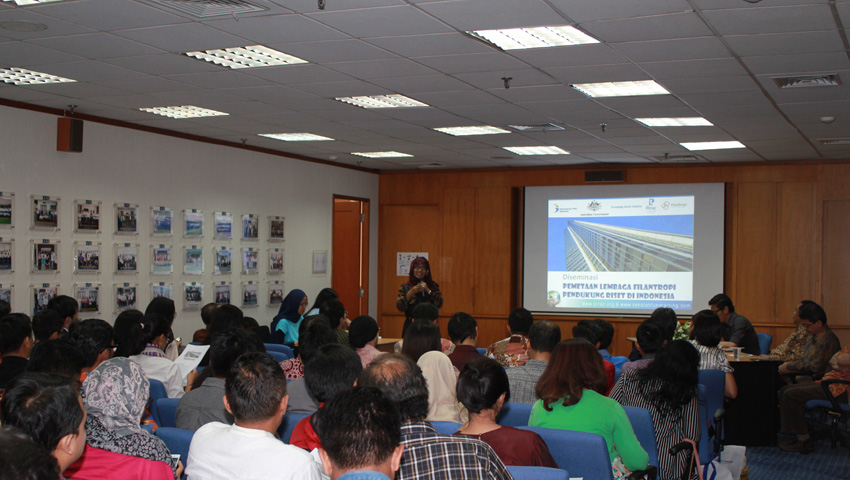In its Long-Term National Development Plan, Indonesia states its goal to close gaps between it and developed countries by 2025. This requires significant, continued investment in research and development to support economic growth and advance the science and technology necessary to make such a leap. In contrast, the country’s research funding is among the lowest in the region, amounting to only 0.09 percent of gross domestic product (GDP)— far lower than South Korea at 3.4 percent, Singapore at 2.5 percent and Malaysia at 1 percent.
Accordng to Muhammad Dimyati, the Director General of Research and Development Reinforcement at the Ministry for Research, Technology and Higher Education, more government funding is needed for research.
“The Government needs to allocate more funding for research to sustain our progress and development,” he said, speaking in Jakarta in August during discussions to present a study by the Public Interest Research and Advocacy Center (PIRAC) on Financing Research by Philanthropy.
The study was supported by the Knowledge Sector Initiative (KSI), a joint programme between the governments of Indonesia and Australia that seeks to improve the lives of the Indonesian people through better quality public policies that make better use of research, analysis and evidence.
While government funding for research is still limited and can be increased, on a more positive note there is already growing philanthropic interest in contributing to the bucket. PIRAC surveyed 28 philanthropic institutions between April and July 2016 and found that each had contributed almost IDR 1 billion for various research programmes in education and research institutions, with a potential fund reaching IDR 1 trillion per year.
This year’s findings support last year’s study conducted jointly between PIRAC and the Jakarta-based Moslem philanthropic organization, Dompet Dhuafa, by surveying 400 companies. The study found that in 2014, donations from companies for philanthropic purposes increased to IDR 12.45 trillion in 2014 from IDR 8.6 trillion per year in 2013.
“Our study found very strong interest from these institutions to contribute to research,” Nor Hiqmah, the Executive Director of PIRAC, said during the discussion. “The funds donated by these donors were used mostly for research on issues of social and economic (26%), science and technology (18%) and philanthropic donor core interests (16%), with the remaining funds going into environment, health and nutrition,” she added.
Muhammad Dimyati underlined the importance of collaboration between philanthropists and research institutions to optimize financing. He highlighted collaboration between the Tahir Foundation and the Bill & Melinda Gates Foundation to fight Malaria. The research is considered important as Malaria outbreaks have occurred in Indonesia, specifically in poor areas.
Notwithstanding its great potential, challenges remain for philanthropic organizations to play a bigger part in research funding. Representatives of philanthropic organizations, including Agus Susanto, the Executive Director of the Tahija Foundation (https://tahija.or.id), and Dr Widjaja Lukito of the Danone Institute (www.danonenutrindo.org), proposed incentives to increase the philanthropic appetite to fund research. They suggested the Government could create incentives such as tax relief, easing of permit issuance processes, support for capacity building and public recognition awards.
KSI will continue to facilitate stakeholder dialogue to explore the constraints to private sector and philanthropic participation and contribution to social science research. It will also encourage dialogue between private sector and philanthropic organizations and the Government of Indonesia regarding regulations on taxation of donations. This is partially a constraint for private sector contributions to social science research.
The discussion concluded that partnerships and support from the Government were required to prevent research redundancies, to improve collaboration between research institutions that work on related issues, and to increase government urgency to create research-friendly policies that, in turn, will produce knowledge-based policies.
More information about PIRAC and the study can be found at:
https://www.pirac.org/2016/08/25/potensi-sumbangan-filantropi-untuk-riset-rp-1025-triliun-per-tahun/
Media Coverage:
- “Philanthropy backs RI’s meager research” – the Jakarta Post, August 29, 2016(https://www.thejakartapost.com/news/2016/08/29/philanthropy-backs-ri-s-meager-research.html)
- “Dorong Filantropis Atasi Minimnya Dana Riset” – Kompas, August 26, 2016 (https://print.kompas.com/baca/sains/pendidikan/2016/08/26/Dorong-Filantropis-Atasi-Minimnya-Dana-Riset)






